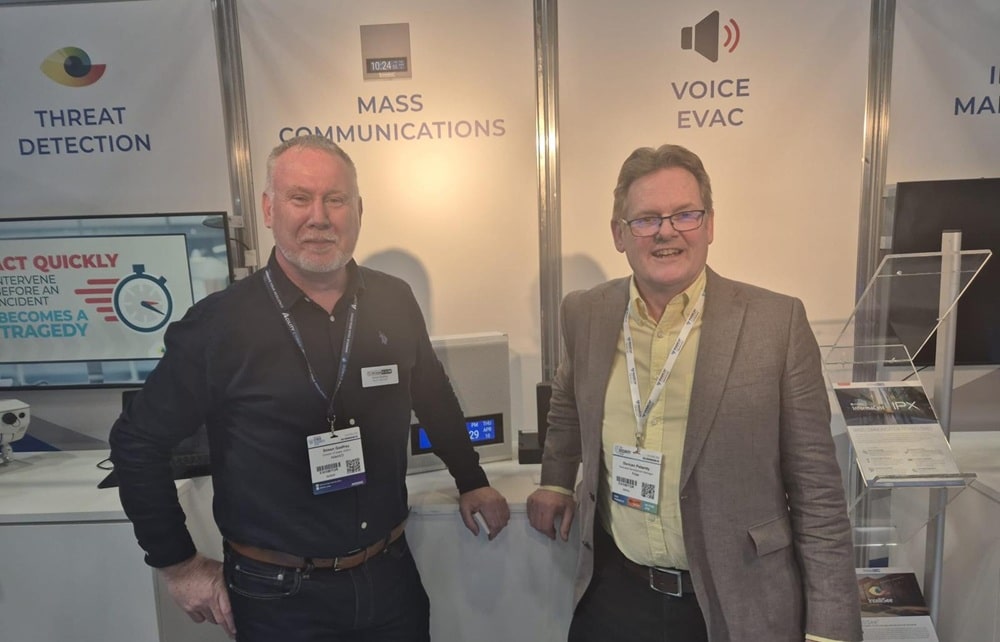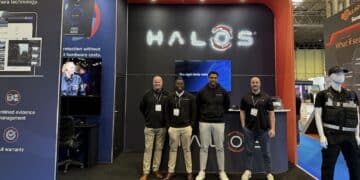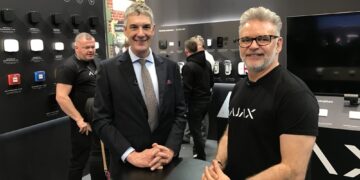AtlasIED is a US-based recognised global market leader in the pro-audio industry, whose products and systems deliver mass communication, high intelligibility announcements, IP-based visual and audio communications, distributed audio, background music, paging, and sound masking solutions to commercial projects of every size and scope, including those which are mission-critical.
With the recent introduction of Martyn’s Law, which writes into law that venues must have effective public communication systems in place in an emergency, AtlasIED, via its specialist audio distributor Polar Integrated Solutions, is bringing its solutions to the UK market. These could include its IPX Speakers and IPX displays, which it showcased at The Security Event this year, as well as a wearable panic button for security staff, and the GLOBALCOM mass communication system, because, where every second matters, clear and effective communication is critical.
At the show, Peter Mawson caught up with Simon Godfrey, Director of Sales – EMEA, AtlasIED, (pictured top left), Duncan Peberdy BDM at Polar Integrated Solutions, (pictured top right), and Michael Peveler, Vice President Sales at AtlasIED to find out more about the company and its plans.
Peter Mawson: “So, we’re here at TSE and it’s day three. How’s the show been for you so far?”
Simon Godfrey: “From my point of view, it’s been a success, we’re building awareness of AtlasIED which is a 90+ year old company based in the US. We don’t just work in security but other divisions as well, but we’re here to focus on the security side of the business. We’re here with our distributor Polar, to try and build better awareness of what we do and bring our security solutions to the UK market.”

PM: “Can you expand out on what the product is that you’re bringing to the market?”
SG: “A lot of the products you see here are used for security events. With the passing and introduction of Martyn’s Law, there are these products that are becoming increasingly important to put into market. Yes, we must define what is going to go to market but going forward, we see that, clearly, we have products that will help in the events space.”
PM: “Martyn’s Law is going to affect the market in the UK and it’s something we’ve been talking about a lot on the platform. So, from a deployment perspective, can you respond very quickly to meet a requirement for Martyn’s Law?”
Duncan Peberdy: “The requirements for Martyn’s Law obviously, will vary according to the size of the organisation – whether they’re entry level or enhanced level, but AtlasIED is a market leader in this area, and the devices can be triggered in a number of ways, from somebody pressing a panic button to somebody in a school office – and in fact, now we have the ability to have little clickers on lanyards which can be deployed instantly.”
PM: “One of the things that I note about audio and public address in its truest form is that the audio is always poor. I’ve been listening to the announcements we’ve been hearing, and we’re just waiting for the thing to shut up because you can’t understand what’s being said. And, in a situation where you have mainstream panic, you need to have that clear instruction.”
DP: “Well, the ability to deploy the system in a number of different circumstances and for it to be really easy to do is important because once a situation kicks in the preparation goes out of the window. You haven’t got time to think, and you have to be able to act, instantly. In so many instances, the ability to respond quickly in the first ‘golden’ hour with medical care, or other first responders. Or the ability to intercept in a situation to stop it escalating and prevent people from moving into areas where they may become more vulnerable is critical.”

PM: “And let’s talk about Polar, you’ve been the choice of AtlasIED as distributor…”
DP: “Polar has been around since the 60s and is now a specialist audio distributor, but although security at the moment isn’t one of our key market verticals, Martyn’s Law and the ability to hear instructions clearly is clearly aligned with our audio expertise, and so that’s going to open up new opportunities.”
PM: “It’s an opportunity for you but also an opportunity for the security industry to get their hands on a product that works, and that is also recognised in the AV sector.”
SG: “And it’s also about the clarity of audio. There are various grades of audio and loudspeakers on the market, but what we want to make sure is that while we’re clear and precise in our message, we’re also clear in what we deploy, and the messages we get out to events. So, we do rigorous amounts of testing to make sure we’re meeting the standards correctly and also testing to make sure that we’re better. We have to make sure that what we’re deploying and selling really meets a high specification.”
AtlasIED started over 90 years ago engineering and manufacturing loudspeakers. While many products used for mass communication are produced by companies with little experience in audio clarity and intelligibility, our products are designed with those characteristics as primary requirements. Even those with displays, flashers, and microphones, the audio clarity is paramount.
PM: “So, you’re bringing a new opportunity to the installation channel really, aren’t you. You’re helping them uplift delivery to what would probably be a major end user…”
SG: “And there are also other channels as well, because we’ve been manufacturing these products for years, and they’ve been very successful in the US market, so later this year we will have multi-language products, in French, in German, Spanish, Mandarin, and others.”
Michael Peveler: “There are a couple of things I’d like to add. Most of your listeners have heard AtlasIED. AtlasIED is the audio system for about 90% of all the largest airports in the United States, and about 65% of the largest airports around the world. So, when you hear a gate change or an announcement in an airport, that’s Atlas IED and we’re very much focused on clarity and articulation. Most of these airport systems are also tied into the airport’s life safety systems and processes, making reliability necessary in these mission critical environments.
“To your point, in a crisis environment, when an emergency happens, we really focus on making sure that we have a high level DB so that we can be clearly heard and understood. And that’s one of the reasons that we’ve had as much success as we’ve had. About 50% of our business is in mass communication. And it’s about how we get the message out instantaneously because seconds matter.

PM: “It’s good to understand those numbers as well, because that tells me all I need to know, and hopefully people will understand that if they are thinking about deploying audio, what that means. So, it looks like you’re in a good position to educate the market?
SG: “It should be said that in the situation with Martyn’s Law and preparing for a critical incident, audio isn’t the only answer. AtlasIED’s system has displays which can be leveraged for visual communication, for example, customizing a coloured background for certain instances like the need to evacuate or stay put, and for anyone that’s hard of hearing, that will obviously be very important, for them to be able to see and read the message.”
MP: “Not only do we have the colour-coding, or colour-messaging, but we also have strobe lights or flashers so we’re looking at lots of different ways to get people’s attention, as people are often distracted with headphones on, or not paying attention.
“We also have microphones built-in, so we can open two-way channels. Panic buttons as well can initiate that two-way channel or an immediate “all-call” type message deployment.”
PM: “For me that’s a good grounding in what you do, is there anything to add?”
SG: “We want to build awareness of the brand, AtlasIED. There are various solutions for the markets that we work in – transport, commercial, security and life safety products.”
DP: “We’ve published some data on Martyn’s Law but as that’s now been passed, we’ll be updating that, now it’s definitive. Not every venue or situation will need technology, but certainly some of the larger venues will.”
For more communications news, click here





